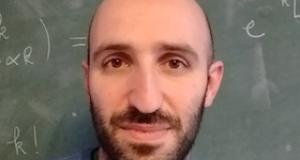
FRANCESCO ZAMPONI
Structure:
Dipartimento di FISICA
SSD:
PHYS-02/A
Notizie
Ricevimento lunedì 16:00-18:00.
Si richiede cortesemente di prendere appuntamento via email per facilitare l'organizzazione del ricevimento.
Pagina web del corso di meccanica analitica e relativistica (laurea triennale in fisica L-30):
https://francescozamponi.github.io/teaching/meccanica/meccanica.html
Pagina web del corso di modelli matematici per la fisica II (laurea triennale in scienze matematiche per l’intelligenza artificiale L-35):
https://francescozamponi.github.io/teaching/modelli-smia/modelli....
Orari di ricevimento
Ricevimento lunedì 16:00-18:00.
Si richiede cortesemente di prendere appuntamento via email per facilitare l'organizzazione del ricevimento.
Insegnamenti
| Codice insegnamento | Insegnamento | Anno | Semestre | Lingua | Corso | Codice corso | Curriculum |
|---|---|---|---|---|---|---|---|
| AAF1821 | INTERNSHIP | 2º | 1º | ENG | Physics - Fisica | 33602 | Teorico generale |
| 10616299 | MECCANICA ANALITICA | 2º | 1º | ITA | Fisica | 33588 | Fisica |
| 10604473 | MODELLI MATEMATICI PER LA FISICA - MODELLI MATEMATICI PER LA FISICA II | 2º | 1º | ITA | Scienze matematiche per l’intelligenza artificiale | 33593 | Curriculum unico |
| 10604473 | MODELLI MATEMATICI PER LA FISICA - MODELLI MATEMATICI PER LA FISICA II | 2º | 1º | ITA | Scienze matematiche per l’intelligenza artificiale | 33593 | Curriculum unico |
| 10616299 | MECCANICA ANALITICA | 2º | 1º | ITA | Fisica | 33588 | Fisica applicata |
| 10616299 | MECCANICA ANALITICA | 2º | 1º | ITA | Fisica | 33588 | Astrofisica |
